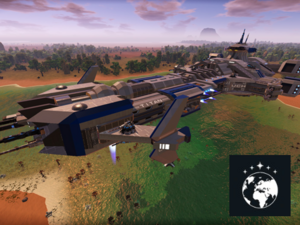United Council of Humanity
| Faction Data | |||||||||||||||||

| |||||||||||||||||
| |||||||||||||||||
Summary
In Andromeda, there are two “human” factions, one of which comprises the survivors of Operation Phoenix, including the missing members of the Hyperion.
Among the survivors are Vice Admiral Perez and the crews of ships not destroyed by the Zirax during the initial encounter, notably the UCH GRAND, a sister ship to the annihilated UCH TITAN. Several thousand individuals and nearly all ships escaped due to Admiral Brenner's sacrifice. The whereabouts of numerous crew members from the UCH TITAN and the also destroyed UCH Heidelberg remain unknown, especially Admiral Yaden and Commander Mercer Senior. Reports suggest that some managed to escape. The search for Yaden and Mercer is a priority, partly because they are seen as potentially responsible for the disaster for various reasons.
Current Situation
By the game's timeline, a base planet has been found, and the associated Phoenix System has been largely developed. Initial industrial and manufacturing operations are in place, and new ships have already been commissioned. This rapid progress within just a year is due to direct and indirect support from the Arkenian Republic, particularly the Polaris Megacorps.
The system, bases, and ships remain under military administration, meaning there are no “civilians.” A state of constant alert persists. Vice Admiral Perez is the nominal commander and decision-maker, supported by various thematic working groups and a council.
Internal Affairs
Within the UCH members, there are two factions with different orientations:
- The Neoterrans consider Earth unreachable and essentially lost, wanting to find a new home in Andromeda without wasting resources on a return.
- The Alterrans want to do everything possible to enable a return or at least send a message to Earth in the Milky Way.
Both factions have roughly equal followings among the survivors. However, when naming the planet, the Neoterrans narrowly won with “New Terra.”
Politics
Society
History
At the end of the 21st century, human civilization nearly ended in an all-out war that ignited over a dispute over control of colonies on the moon and claims to resources in the asteroid belt. Armageddon was averted at the last moment. Nevertheless: the colonies on the moon were lost. The Earth itself was so battered by 50 years of armed conflict that the civil catastrophe was immediately followed by ecological fallout. Having survived nuclear weapons and orbital bombardment, as well as the destruction of virtually all above-ground structures, humanity was helpless in the face of the looming ecological catastrophe.
Countermeasures had become nearly impossible. The war had destroyed not only life but, ironically, those higher technological and civilizational achievements that might have contributed to the recovery of the planet or at least to the survival of society.
The final collapse of civil society, nations and countries led humanity into dark centuries from which it could only slowly and at great sacrifice extricate itself.
When the survivors started to rebuild civilization at the beginning of the 24th century, the first groupings of cities, countries and nations were formed. Conflicts broke out again, driven primarily by distribution struggles for the few resources still available. Only looking back at the suffering and death of previous centuries ensured a fragile peace.
In 2402 AD, things changed fundamentally: an expeditionary corps found an alien ship under the snows of Antarctica in 2402 AD.
Non-Military
Ground Troops
Robots:
Pets: